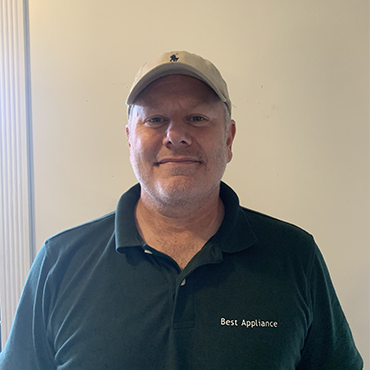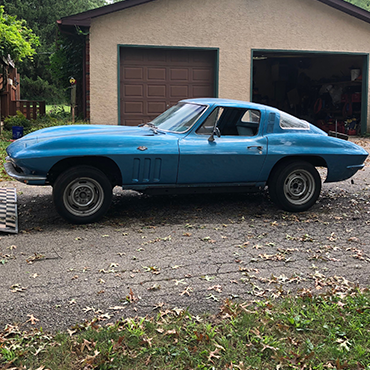Welcome to the next installment of our Service Provider Spotlight series. In each article, we shine a light on one of the knowledgeable service pros we trust to provide excellent work to Cinch customers. It’s your chance to get to know some of the awesome personalities behind the toolboxes.

Jeff Jordan and his wife, Erin, are the duo behind Best Appliance, which is run from their home outside Columbus, Ohio, and services any location within 100 miles — from the western part of the state all the way to Delaware.
During our hour-long video call, Jeff described a way of life that seemed distinctly Midwestern. He grew up in a quintessential American suburb in the 80s, saved his money as a teenager and bought a muscle car the day he got his driver’s license. He was introduced to his trade the old fashioned way, through his father, whom he’d accompany to work on occasion. He was raised on homespun values like “an honest day’s work” and things that are “made to last.” But what stood out more than anything was his earnestness, his empathy and his belief in his occupation. “I don’t just fix appliances,” he told me. “I fix customers.”
Indeed, when appliances break down — especially newer models — people get angry. And it’s not just because of a deductible or the aggravation; it’s a loss of faith in a world where things are supposed to work. That may sound dramatic, but I believe it because I’ve experienced it a time or two in my life. As Jeff reiterated throughout our conversation, a good technician does more than just restore your appliance: They restore a sense of hope.
Cinch: Your town sounds like the perfect American suburb. How long have you lived there?
Jeff: I’m 49 years old, and I’ve lived here for 49 years.
Cinch: And you specialize in indoor appliances?
Jeff: I fix all appliances inside the house, but my specialty is refrigeration — particularly the LG and Samsung market.
Cinch: Why refrigeration?
Jeff: My dad did commercial HVAC work for 40 years and used to take me to work with him. That’s how I got started. While my friends went off on spring break or summer vacations, I went to work with my dad. One day, he just said, “Jeff, come to work with me.”
Cinch: So, that was the moment?
Jeff: My dad always worked on our cars. So, I’d be out there, holding the light, while he’d be under the hood. He’d quiz me on stuff. Then, finally, he just made me do the work while he watched. It was sink or swim. That’s how you learn.
Cinch: What kind of car?
Jeff: A ’65 Corvette. We were a muscle-car family. When I was 12, my dad told me, if I saved my money, he would match it on the day I got my license so I could buy a car. So, I got a paper route and saved up $2,200, and sure enough, the day I got my license, he matched it, and I bought a ’79 Trans Am, big-block automatic. So, I didn’t just learn how to fix things; I learned about work ethic.

Cinch: So, you’re sort of genetically predisposed to fixing things. How did you make the leap from following your dad to work to repairing indoor appliances?
Jeff: I started out at H.H. Gregg (a defunct appliance and electronics chain, headquartered in Indianapolis). They stuck me in an empty van, gave me a route and said “go fix things.” This was before the internet, but there was a lot of literature, so I tore into whatever books I could get my hands on: diagnostics, error codes — you name it. At home, I started opening up the control boards of old electronic devices to see if I could fix them, look for burn spots, solder things back together — trial and error. Once you understand how the basics work, things become less intimidating. Not to knock this generation, but a lot of younger people don’t get that. But, the older guys I used to learn from, they’ve forgotten more stuff than I could ever know.
Cinch: So, that’s how you honed your craft. Then, you went off on your own?
Jeff: I like making my own schedule. I like doing the work, talking to customers. Erin enjoys talking to the customers. That’s what having your own business allows you: the time to really listen and talk to the customers. Some other places, the techs have a hectic schedule, so they really have to get in and out as quickly as possible.
Cinch: Let’s talk about refrigerators since that’s your focus. In your experience, what’s the most common fridge problem?
Jeff: The condenser fan motor goes. If that stops, the fridge will overheat. And, a lot of times, you need to order a part, and that could take days. And when you have a family with three kids and all their food is going to spoil, that makes for some upset customers — even if it’s a fixable, fully covered repair. One temporary solution while waiting for that part: Pull the fridge out from the wall, remove the back cover, get a box fan or something and just aim it at the fridge, and that will cool down the condenser and get your fridge running again.
Cinch: Have you done that?
Jeff: Oh, yeah. It’s not pretty, but it beats not having a fridge and losing a couple hundred dollars’ worth of spoiled food.
Cinch: Did you figure that out yourself?
Jeff: I learned it from the older guys. They have all sorts of tricks like that.
Cinch: Are there any warning signs your fan motor is on the fritz?
Jeff: The outside of the fridge is hot to the touch or warmer than usual.
Cinch: Is the adage, “they don’t make things like they used to,” true?
Jeff: It is. Not so much because things are made cheaply nowadays — although I’m sure that’s true in some cases — but more that they’re over-engineered. More bells and whistles — Energy Star standards that require machines to be quieter or more efficient. More gadgets mean the potential for more problems. Same with cars. Same with anything. I will say confidently that the last appliance you owned will outlast the next two.
Cinch: What’s the most preventable everyday issue you see?
Jeff: Probably the GFI switch (GFI stands for ground fault interrupter, common in areas where electricity can get near water, like laundry rooms). An energy spike can trip the switch. A lot of people don’t know that. They just know the machine isn’t working. On a call like that, I can’t, in good conscience, just go there and push a button for $125 (or whatever the deductible is), so I’ll try and give the customer their money’s worth. I’ll take a look at the rest of the appliance, give everything a once-over and see if there are any other potential issues that might arise.
Cinch: That’s nice to hear.
Jeff: This really is a people business. We try to make the customer the first priority. If someone calls with an issue, we try and diagnose it over the phone. We ask the customer to check the warranty first to make sure it’s covered (if we don’t know already). We do everything we can to make sure the customer is happy — even if that means avoiding a visit for whatever reason.
Cinch: Last question — do you have a muscle car you’re working on at the moment?
Jeff: My dad’s ’65 Corvette. He gave it to me, and one day, I’ll give it to my kids.
The information in this article is intended to provide guidance on the proper maintenance and care of systems and appliances in the home. Not all of the topics mentioned are covered by our home warranty or maintenance plans. Please review your home warranty contract carefully to understand your coverage.